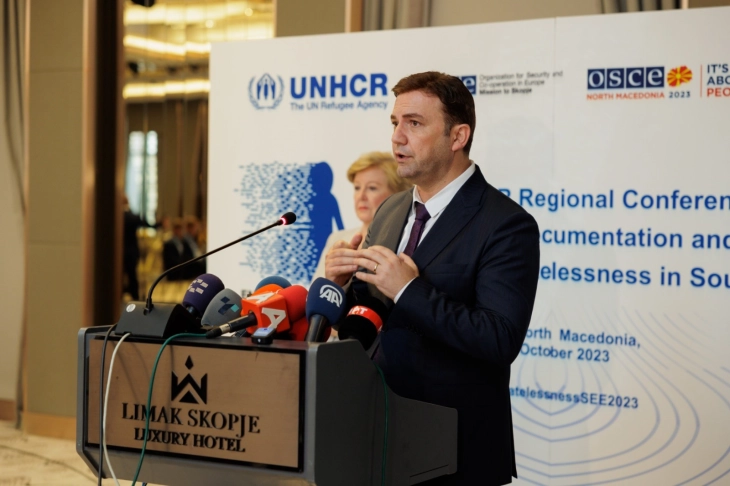Rooting out statelessness requires political will to improve legislation, N. Macedonia leader in region: conference
- Statelessness is a global issue that affects millions of people all over the world, depriving them of their basic human rights. The legal amendments adopted by North Macedonia in the past period represent a sound basis for the country to become the first in Europe to root out statelessness, said Foreign Minister and OSCE Chairperson-in-Office Bujar Osmani in his address Tuesday at the Regional Conference on Access to Civil Documentation and Prevention of Statelessness in South-Eastern Europe in Skopje.
- Post By Angel Dimoski
- 16:29, 17 October, 2023

Skopje, 17 October 2023 (MIA) – Statelessness is a global issue that affects millions of people all over the world, depriving them of their basic human rights. The legal amendments adopted by North Macedonia in the past period represent a sound basis for the country to become the first in Europe to root out statelessness, said Foreign Minister and OSCE Chairperson-in-Office Bujar Osmani in his address Tuesday at the Regional Conference on Access to Civil Documentation and Prevention of Statelessness in South-Eastern Europe in Skopje.
The Conference is organized by the UN Refugee Agency (UNHCR), the OSCE Mission in Skopje, the OSCE High Commissioner on National Minorities, and the OSCE Office for Democratic Institutions and Human Rights (ODIHR), under the auspices of North Macedonia’s OSCE Chairpersonship,
The Foreign Minister stressed that the participation of stateless people in public life, and their inclusion in the decision-making processes, are fundamental key elements of the OSCE’s commitments.
“By effectively solving this issue, we can contribute to a stable society, and a fairer and more just world. We are working for the benefit of people, and this is the guiding principle of our chairpersonship,” added Osmani.
Osmani conveyed the experiences of North Macedonia in terms of dealing with the issue.
“In 2020, we adopted a new Law on Unregistered Persons in order to facilitate the realization of the socio-economic rights and access to public services to all individuals who, due to statelessness, were previously marginalized. In June 2023, following comprehensive consultations with all relevant agencies, we adopted amendments to the Law on Civil Registry establishing a framework for a systemic solution and prevention of new cases of stateless individuals. These decisions say a lot about the clear political will and commitment required to root out statelessness and provide all unregistered individuals with a legal identity,” said Osmani.
The status of statelessness, stressed Osmani, must not mean an automatic deprivation of elementary human rights.
“No one deserves to be prevented from fulfilling their human rights. Not one person, with or without statehood, deserves this fate. Unfortunately, stateless people face a series of restrictions in terms of their socio-economic rights and freedom of movement, constantly having to fear persecution which is in complete opposition to the basic principles of humanism and elementary humanity,” said Osmani.

The UNHCR’s Assistant High Commissioner for Protection, Gillian Triggs, welcomed the country’s readiness to root out statelessness by the beginning of 2024, as well as the fact that the issue is among the priorities of its OSCE Chairpersonship.
“Twelve years after the adoption of the Zagreb Declaration, more than 6000 people in the region have acquired statehood. A constant political will is necessary to completely root out statelessness. This is an ambitious goal, but it is achievable. The leadership of North Macedonia and the other countries from the region is especially important in securing that political will, and is an example of the best practices on a global level,” said Triggs and invited the countries to join the global campaign to end statelessness.
The head of the OSCE Mission in Skopje, Kilian Wahl, illustrated the country’s progress in tackling statelessness achieved as a result of the improvement of legislation, which, he said, could serve as an example for the region, and globally.
“Ten months ago, when I assumed this post, there were almost around 700 unregistered individuals, as of today, that figure has dropped to 216. I hope, and I believe, that through continued political commitment we will be able to reduce that number to zero, and that by the end of the year North Macedonia will successfully close this issue,” said Ambassador Wahl.
The conference is attended by representatives of the national governments and civil society from North Macedonia, Albania, Bosnia and Herzegovina, Croatia, Montenegro, and Serbia.
Photo: MIA/MFA







